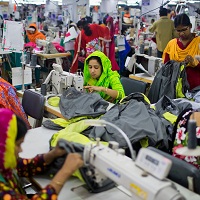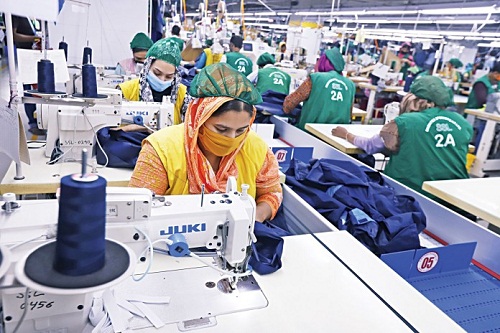 Despite COVID-19, Bangladesh will continue to dominate the world apparel sourcing market, says a new study by the Centre for Policy Dialogue (CPD) and the Institute of Policy Studies (IPS) of Sri Lanka. The findings of the study were recently presented at a webinar titled 'Recovery of the apparel sectors of Bangladesh and Sri Lanka: is a value-chain-based solution possible?'
Despite COVID-19, Bangladesh will continue to dominate the world apparel sourcing market, says a new study by the Centre for Policy Dialogue (CPD) and the Institute of Policy Studies (IPS) of Sri Lanka. The findings of the study were recently presented at a webinar titled 'Recovery of the apparel sectors of Bangladesh and Sri Lanka: is a value-chain-based solution possible?'
The webinar began with the acknowledgment that Bangladesh is currently facing reduced demand from key markets such as the US, UK and EU. As a per Daily Star report, its success in dealing with these challenges will depend on how far the country is able to control the impact of COVID-19 on its garment industry. Many sourcing countries have either re-shored their orders to a limited number of sourcing countries. This led to a 2 per cent decline in Bangladesh share in global knitwear market last year. The country’s share in woven segment also declined 1 per cent during the period.
Need for a redistributive approach to orders
Bangladesh further risks losing $2 billion worth of orders to China if it fails to adopt a redistributive approach. The country failed to support its apparel sector during the crisis due to fiscal constraints. It was unable to disburse the allotted $1.2 billion subsidized credit to all garment factories. Also by October 2020, over 360,000 workers lost jobs. The country could reimburse only 14 per cent of retrenched workers. Fifty-eight per cent of workers faced financial difficulties, and 82 per cent struggled to meet daily needs.
sector during the crisis due to fiscal constraints. It was unable to disburse the allotted $1.2 billion subsidized credit to all garment factories. Also by October 2020, over 360,000 workers lost jobs. The country could reimburse only 14 per cent of retrenched workers. Fifty-eight per cent of workers faced financial difficulties, and 82 per cent struggled to meet daily needs.
Buyers also failed to respond to manufacturers call during the crisis, said Mostafiz Uddin, Managing Director, Denim Expert who does not expect to recover all his arrears from buyers as COVID-19 has impacted not just lead times but also contracts and prices.
Resilience and digitization for rescue from disasters
Husni Salieh, Director, MAS Holdings, advised stakeholders to work collaboratively, particularly during the crisis. He said, only resilience can help them face the current crisis successfully. Pierre Börjesson, Head-Sustainability, called for speeding up digital marketing to ensure supply chain remains immune to the effects of any natural or human disasters. Dan Rees, Director, Better Work, a flagship program of the ILO, urged for more cooperation amongst stakeholders and a long-term plan for workers.












